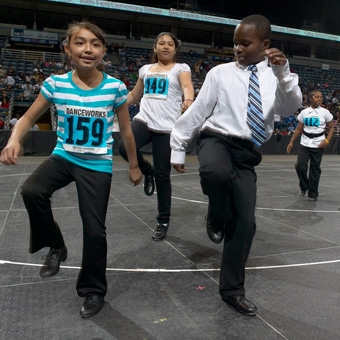Milwaukee Neighborhood News Service
PROBLEM WITH THIS WEBPAGE?
Report an accessibility problem
To report another problem, please contact cailin.hostad@marquette.edu.
 Marquette Instructor Teaches Local Kids Self-Esteem Through Dance
Marquette Instructor Teaches Local Kids Self-Esteem Through DanceIt began with a vision: promoting positive recreational activity and self-esteem in urban children through dancing. The program, called "Mad Hot Ballroom" launched in New York City in the 1990s and was the subject of a documentary.
This documentary was the seed of inspiration for Milwaukee non-profit group Danceworks to form "Mad Hot Ballroom and Tap," a local variation of the New York outreach program. From the start, Danceworks founding member and Marquette instructor Amy Brinkman-Sustache helped play a vital role.
Now into its fourth year, Mad Hot Ballroom and Tap continues to gain momentum. Brinkman-Sustache and her associates work throughout the year with fourth through sixth grade children in the Milwaukee Public School system to teach the fundamentals of traditional dance, covering the tango, swing, salsa and tap dancing.
The intensive program meets at participating schools twice per week for twelve weeks. During this time instructors work in the classroom to help kids develop their dance skills as well as important life skills. At the end of the four months, schools are eligible to enter in an annual citywide dance competition in which students dance against one another.
The outreach program targets at-risk youth and encourages them to stay in school at a critical time in their lives. Brinkman-Sustache has heard parents, teachers and administrators describe the difference that the program has made in the lives of the students, citing improved attendance, attitude and even grades.
"It shows the kids that they can build friendships and relationships; that they can be good at something,” she says.
Though successful, the program has also faced its share of challenges. Brinkman-Sustache cites issues such as funding, space limitations and finding a way to include the nearly 2,300 enthusiastic participants.
When asked about the outcome of the program, Brinkman-Sustache points to the transformative power that she has observed in the lives of many young participants.
"The kids work together as a team, which leads to discipline that translates to other areas of their lives," she says. "Kids who have struggled academically find something that they can be proud of; that they can achieve. They can do something that they never imagined and that motivates them in other areas."